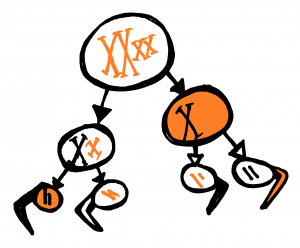
Causes of Bipolar Disorder
It is still not clear what causes people to develop bipolar disorder. In fact, most people agree that it is unlikely to have one cause, and more likely to be the result of a combination of genetic vulnerability, life events, and particular styles of thinking.
Genetic risk

No gene has been identified that can be shown to cause bipolar disorder. Geneticists are now looking at patterns across many genes to see if there are particular combinations which might be more common in people with bipolar disorder.
It is true that some people are more genetically vulnerable to developing bipolar disorder than others. The general population chance of having bipolar is about 1 in 100. However, people with a first degree relatives with bipolar (parent or sibling) have a 1 in 10 (10%) chance of also having the diagnosis. This might sound like a big jump but it still means they are much more likely not to develop it (90%). Therefore clearly genes are not the whole story.
Life events in childhood

In general our mental health is linked to what happens to us in life. People who experience trauma or high levels of deprivation or abuse in early life are more likely to experience mental health problems than those who don’t. But not everyone with mental health problems has experienced negative life events in childhood. The exact mechanisms by which life events are linked to later mood disorders such as bipolar disorder, is not yet clear.
Ongoing lifestyle

Circadian rhythms are the natural changes in our body that occur over a 24 hour cycle, including sleep-wake cycle, alertness and appetite. Social rhythms are general routines such as work and socialising patterns. Both of these rhythms are closely linked to mood. When our circadian and social rhythms are more regular, our mood is more stable.
People with Bipolar Disorder tend to show more disrupted circadian and social rhythms. It’s not clear to what extent these cause or are a consequence of mood swings, but many people find that creating a more regular rhythm to daily activities can help keep mood more regular.
Extreme thinking styles

We all recognise that when we are low in mood we tend to take a negative view of things. In depression this is extreme and can lead to the person discounting anything positive, and assuming everything will be bad and will be their fault. This maintains their depression.
People with bipolar show evidence of this extreme negative thinking, but also show extreme positive thinking styles during periods of mania e.g. “Everything will work out nothing can go wrong”, or “I am making all these good things happen”. These thoughts can fuel continuation of mania.
Talking therapies such as cognitive behaviour therapy (CBT), try to target these thinking styles in an attempt to regulate mood. See module “Managing stress – thinking differently” for more on thinking traps and Module “Treatment Options” for more information about CBT.
Watch William discuss the causes of bipolar disorder


